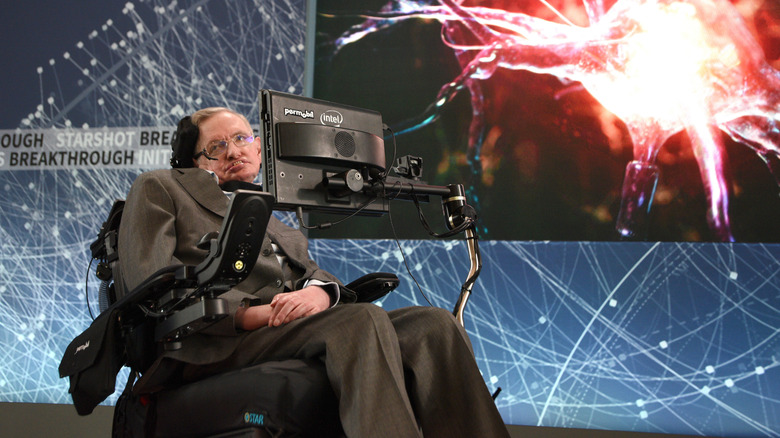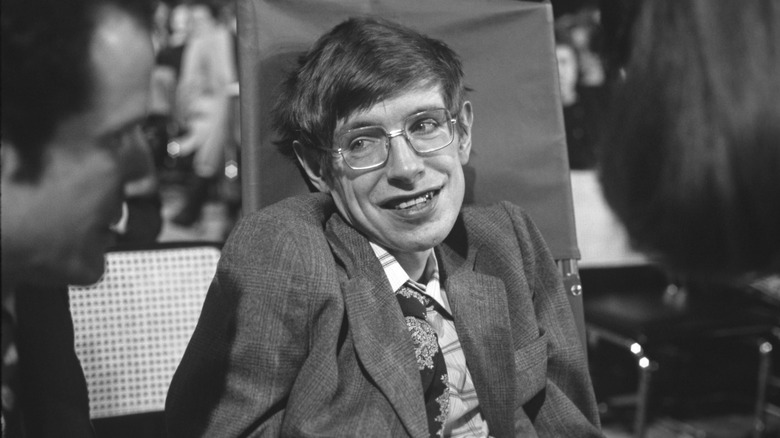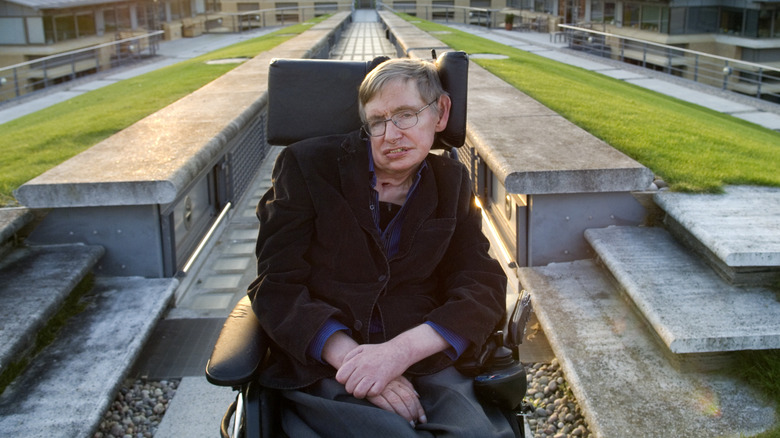Why Stephen Hawking Never Talked About His IQ
Stephen Hawking: He was a smart guy, right? Amongst other accomplishments, he was the OG black hole guru and postulated that black holes don't actually swallow information forever, but lose it slowly in the form of virtual particles, dubbed Hawking Radiation. So did Hawking ever blab about how smart he was? Did he ever take those little online quizzes that tell you that you're totally a genius if you solve eight out of 10 little puzzles? To the latter question: We're guessing that Hawking wouldn't have given a flying you know what about them. And to the former question: No. In fact, as he told The New York Times back in 2004 people who brag about their IQs are "losers." And if this makes you feel like chastising an actual genius in a wheelchair, then you've made Hawking's point.
But Hawking, true to his own rule, never called himself a genius. In that same New York Times interview, the reporter pressed the professor on his intelligence. First, she asked bluntly, "What is your I.Q.?," then tried to get clever by tossing some mathematical vocabulary into the mix, asking, "How can we know if you qualify as a genius physicist, as you are invariably described?" Then, she asked, "Are you saying you are not a genius?" To this last question, Hawking simply said, "I hope I'm near the upper end of the range."
As for why Hawking felt this way, we can only speculate. But a guy as sharp as Hawking certainly understood that, while IQ scores do measure general cognitive aptitude, they're not the final word on skill and ability. They also say nothing of a person's accomplishments.
Stephen Hawking had nothing to prove
As stated, nowhere did Stephen Hawking state why he thought IQ scores were BS. But with a little investigation and thinking, we can come to some sound conclusions about why he thought so. To preface the discussion, we could simply ask: Who else would brag about IQ scores except people who feel under-accomplished? Why not just get out there and do stuff? And for someone who accomplished as much as Hawking, and stayed as motivated as him – while living with amyotrophic lateral sclerosis (ALS) for the last 55 years of his life — he certainly didn't have anything to prove by blabbing about test scores.
Most people get diagnosed with ALS from the ages of 55 to 75, and have an average life expectancy of three years after receiving their diagnosis. Hawking got his diagnosis at 21 and lived until 76. That is so, so, absurdly far above the curve — as much above the curve as Hawking's mind — that it seems impossible. Hawking needed 24-7 care most of his life and spoke using a computer system that he operated using his cheek. And, he remained a workhorse until death, researching, lecturing, and only retiring from Cambridge's Department of Applied Mathematics and Theoretical Physics in 2009 at 67 years old. That's practically standard retirement age.
So Professor Hawking's comment about IQ scores being for losers? You could take it as encouragement. For those who feel discouraged or consider themselves dumb, Hawking's words could be a clap on the shoulder along the lines of, "Buck up, you can do it, anyway."
Questioning the nature of intelligence
There's another good reason why Stephen Hawking might have thought that IQs are irrelevant. We can explain this best by analogy, starting with an unlikely person: Wolfgang Amadeus Mozart. Few people would contest the statement, "Mozart was a musical genius." But do we think, all other things being equal, that Mozart could have thrown down mathematics with Hawking? Or that Hawking could have written "The Magic Flute"? And yet, both people are popularly called "geniuses." William Shakespeare was a genius of language, Pablo Picasso was a genius of the visual arts, Aristotle was a genius of logic, and so forth. How many of them could have performed so well outside of their domains?
And did any of these individuals take a single IQ test? The Wechsler Adult Intelligence Scale (WAIS-V) — one prominent intelligence quotient (IQ) test — measures visual-spatial ability, fluid reasoning, working memory, attentiveness, and more. It does not measure creativity, self-awareness, emotional intelligence, social skills, productivity, or anything else that actually leads to abilities becoming useful. And while IQ tests have proven to be a reliable and valid method of assessing global cognitive abilities for over a century now, of course, they don't provide the full picture of a person. Psychologist Howard Gardner's 1983 Theory of Multiple Intelligences posits eight types of intelligences that fit our genius examples above: visual-spatial, linguistic-verbal, interpersonal, intrapersonal, logical-mathematical, musical, bodily-kinesthetic, and naturalistic.
Bottom line: Even though it's common sense to think that IQ scores are not the end-all, be-all of human talent and aptitude, there's even evidence stating as much. It makes sense that a person of Hawking's caliber understood this.


